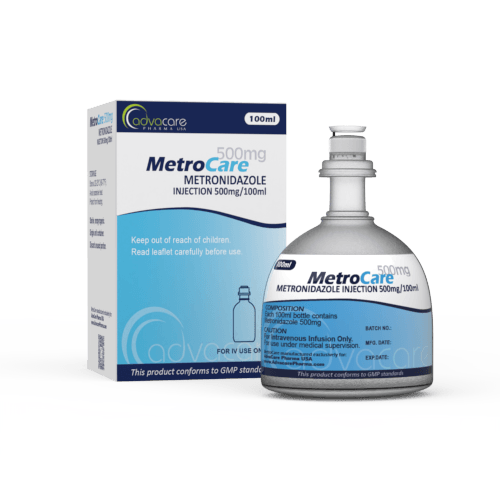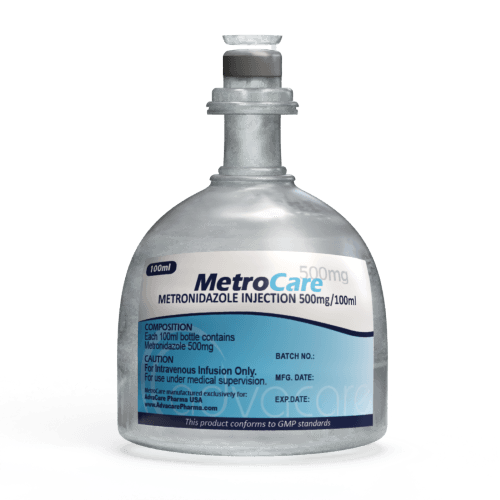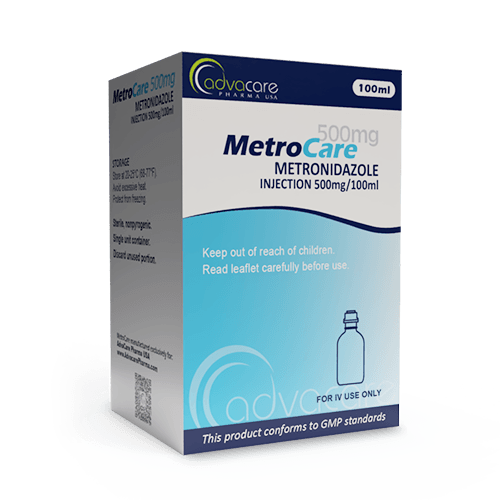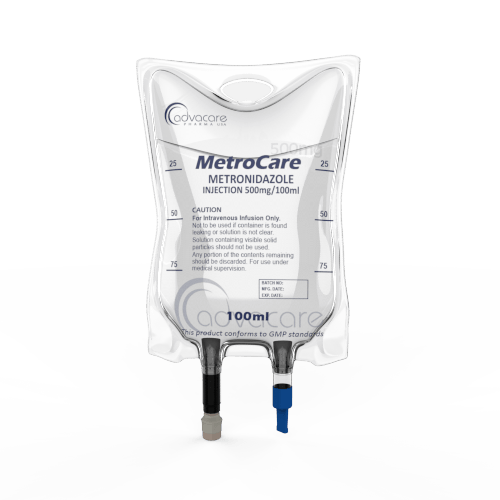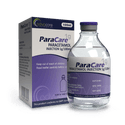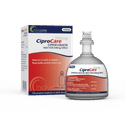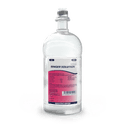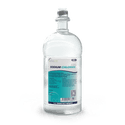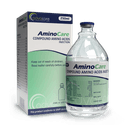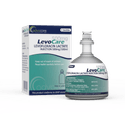- Home›
- Pharmaceuticals›
- Injections›
- Large Volume Injections›
- Metronidazole Injection
Metronidazole Injection
Dosage
Packaging
What is Metronidazole?
Active Ingredients: Metronidazole
Metronidazole Injection is used to treat serious infections caused by anaerobic bacteria or protozoa. It is prescribed to treat infections in many parts of the body, such as the gastrointestinal tract, bones, joints, and nervous system. This drug is also used with other medications to treat ulcers caused by H. pylori.
Metronidazole is also used as prophylaxis to prevent infection, particularly in patients undergoing colorectal surgery.
Metronidazole is a broad-spectrum nitroimidazole with antiparasitic and antimicrobial properties. Though its exact mechanism of action is unknown, it is known to work by inhibiting nucleic acid synthesis. Metronidazole shows activity against gram-negative anaerobic bacteria, gram-positive anaerobic bacteria, and protozoa.
Metronidazole is employed for the treatment of various conditions such as trichomoniasis, amebiasis, inflammatory lesions of rosacea, and bacterial infections. As a widely prescribed antibiotic within the nitroimidazole class, it demonstrates efficacy in managing gastrointestinal infections, trichomoniasis, giardiasis, and amebiasis—parasitic infections. Its distinctive antiparasitic properties extend its application to a diverse range of infections. The antimicrobial cytotoxic effects of metronidazole are likely attributed to the reduction of its nitro group by anaerobic organisms, leading to DNA strand damage in microbes. Having been utilized as an antibiotic for several decades, metronidazole exhibits broad-spectrum activity against gram-negative anaerobic bacteria, gram-positive anaerobic bacteria, and protozoa.
Injectable metronidazole is well-absorbed and distributed widely in body fluids, with penetration into cerebrospinal fluid resulting in high concentrations. Its function is mediated by an intermediate in metronidazole reduction, binding to deoxyribonucleic acid and electron-transport proteins in organisms, thereby blocking nucleic acid synthesis. Metronidazole enters cells through passive diffusion, and its bioavailability after oral administration exceeds 90%.
Widely distributed throughout the body and various body fluids, including bile, saliva, breast milk, cerebrospinal fluid, and the placenta, metronidazole exhibits less than 20% binding to plasma proteins. Metabolism occurs in the liver through hydroxylation, oxidation, and glucuronidation, with several metabolites found in the urine unchanged. The drug is primarily eliminated through urine (60-80%), with 6-15% excreted in the feces. Patients with hepatic impairment may require dosage adjustments.
While metronidazole metabolism primarily occurs in the liver and is predominantly excreted through urine, elimination is not significantly reduced in individuals with renal insufficiency. Caution is advised in patients with end-stage renal disease due to potential metronidazole metabolite accumulation.
This drug is available in the form of a tablet, capsule, or oral suspension.
AdvaCare Pharma is a GMP-certified producer and exporter of Metronidazole Injection. We offer a wide range of high-quality and cost-effective medical products that are available for distribution. These medications have been manufactured in our facilities in China, India, and the USA.
Why are we a quality Metronidazole manufacturer?
AdvaCare Pharma is a leading manufacturer of Metronidazole Injection. For 20 years, we have been in the business of manufacturing GMP-approved high-quality, affordable pharmaceutical injection products to improve healthcare worldwide. Our control of the supply chain is data-driven and methodical, supported by highly skilled teams of professionals.
As a large-scale Metronidazole manufacturer, we supply pharmaceutical distributors, hospitals, pharmacies and other medical organizations in more than 65 countries.
Uses
What is Metronidazole used for?
It is used to treat certain anaerobic bacterial infections, such as
- intra-abdominal infection (including peritonitis)
- skin and skin structure infections
- gynecologic infections (including endometritis)
- bacterial septicemia
- bone and joint infections, as adjuvant therapy
- central nervous system infections (including meningitis)
- lower respiratory tract infection (including pneumonia)
- endocarditis
This drug is especially efficient in the treatment process of:
- Balantidium coli
- Trichomonas
- Fusobacterium infections
- Peptococcus and Peptostreptococcus infections.
- Entamoeba histolytica
- Giardia lamblia
- Eubacteria
- Bacteroides species infections
- Clostridium infections
- Anaerobic cocci
- Gardnerella vaginalis
The off-label treatment of this drug includes: periodontal disease, Crohn's disease, preterm birth prevention, Helicobacter pylori infection.
It is also used as prophylaxis for contaminated or potentially contaminated bowel surgery.
How are Metronidazole Injections used?
This medication is manufactured as a solution to be administered intravenously. It is to be administered by a healthcare professional in the hospital or clinic setting.
What dose should be given?
For infections, the usual dose for adults is 500-1000mg, given every 6 hours for 7 to 10 days. The maximum dosage is 4g in 24 hours.
The usual dose for children is 22.5-40mg/kg/day, given every 8 hours.
Refer to a doctor or pharmacist for guidelines on dosage. Do not exceed what they advise.
Who can be treated with Metronidazole Injections?
Metronidazole is a medication utilized for individuals dealing with bacterial or protozoan infections. It proves effective in treating both facultative anaerobic and aerobic bacteria. The drug is particularly useful for addressing infections caused by protozoan parasites such as Trichomonas vaginalis, Entamoeba histolytica, and Giardia intestinalis. Treatment for Trichomonas vaginalis generally yields positive outcomes, except for cases involving patients beyond the first trimester of pregnancy.
Metronidazole can be employed to treat infections affecting various parts of the body, including the skin, abdomen, heart, reproductive organs, central nervous system, and respiratory system. The versatility of its application makes it a valuable option in combating a wide range of bacterial and protozoan infections.
Can pregnant and lactating women be treated with Metronidazole Injection?
Studies in certain animal species have shown an increased risk of carcinogenic activity with metronidazole use in reproduction studies. Although most human studies have not demonstrated an elevated risk of cancer, birth defects, or other fetal adverse effects following metronidazole use during pregnancy, some studies have reported instances of cleft lip (with or without cleft palate) in neonates born to women who took metronidazole during the 1st trimester.
While some experts advise against metronidazole use in the 1st trimester, the Centers for Disease Control and Prevention's (CDC) 2021 sexually transmitted infections treatment guidelines suggest treatment at any stage of pregnancy for trichomoniasis.
Metronidazole does enter breast milk, and its use during breastfeeding is not recommended. The levels of both metronidazole and its metabolite are lower than the amounts used to treat infections in infants. Short high-dose regimens are not recommended. Some sources suggest discontinuing breastfeeding until 12-24 hours after the completion of metronidazole therapy. Exposure to metronidazole has been associated with candidal infections and diarrhea in infants.
Other warnings
High doses of metronidazole may potentially mask symptoms of syphilis. Patients undergoing treatment should be closely monitored for signs of bone marrow depression and symptoms of peripheral neuropathy. Prolonged treatment should be avoided, and patients are strongly advised against consuming alcohol during and after the treatment. Regular liver monitoring is recommended for patients with Cockayne syndrome.
If metronidazole is administered for a duration exceeding 10 days, regular clinical and laboratory monitoring is advisable. Patients should be monitored for potential adverse reactions, including peripheral and central neuropathy. It is essential to recognize that, even after the elimination of Trichomonas vaginalis, a gonococcal infection might persist.
Caution is urged when considering metronidazole treatment in patients with active or chronic severe neurological disorders, as the treatment may potentially exacerbate the existing condition. Furthermore, caution is recommended in patients with end-stage renal disease, as metronidazole metabolites may accumulate. Regular monitoring is advised in these cases to detect potential adverse effects associated with metronidazole, particularly central nervous system effects such as headaches, convulsions, and peripheral neuropathy, characterized mainly by numbness or abnormal sensations in extremities.
Side Effects
As with all pharmaceuticals, some unwanted effects can occur from the use of Metronidazole Injection.
Common side effects include, but may not be limited to:
- swelling near the injection site
- unusual taste
- vomiting
- diarrhea
- thirst
- loss of appetite
- tingling sensation
Serious side effects may include:
- signs of an allergic reaction
- signs of a new infection
- problems with urination
- confusion or lightheadedness
- vaginal itching or discharge
- neurologic issues (with long-term usage)
For a comprehensive understanding of all potential side effects, consult a medical professional.
If any symptoms persist or worsen, or you notice any other symptoms, please call your doctor.
Precautions
Do NOT use Metronidazole Injection if:
- You are allergic to metronidazole or any other ingredient.
- You are pregnant in the first trimester.
- You have used disulfiram in the last 2 weeks.
- You are using alcohol or propylene glycol products.
This medication may not be appropriate for individuals with specific conditions, including:
- Cockayne syndrome
- kidney or liver disease
- blood disease
- arrhythmia
- yeast or fungal infection
Patients are advised to communicate with their healthcare providers regarding the use of other medications, both prescribed and over-the-counter.
Pregnant individuals should avoid taking this drug unless specifically prescribed by a doctor after a thorough benefit-risk assessment.
Patients with renal or liver impairments should inform their healthcare providers before taking this medication.
Individuals who are pregnant, breastfeeding, or planning pregnancy should inform their healthcare providers due to the potential transfer of the drug into breast milk, rendering it unsuitable for breastfeeding. Serious adverse reactions in infants may result from maternal use.
It is crucial to abstain from consuming alcohol while taking this medication. Alcoholic beverages or products containing alcohol or propylene glycol should not be ingested while taking this medication and for at least 3 days after the final dose. The combination of alcohol and propylene glycol with metronidazole may cause nausea, vomiting, stomach cramps, headache, sweating, and flushing (redness of the face).
Patients should store this medication in a place that is inaccessible to children and pets.
Before treatment, consult your doctor regarding any medications you are taking to address potential drug interactions.
Metronidazole 500mg: Why the most common dose?
Metronidazole 500mg is frequently prescribed for its efficacy in treating various bacterial and protozoal infections. It provides a strong therapeutic effect while minimizing the risk of resistance and side effects.
References
Efficacy and safety of metronidazole injection for the treatment of infectious peritonitis, abdominal abscess and pelvic inflammatory diseases in Japan
Metronidazole (MNZ) is standardly used for cases of trichomoniasis, anaerobic infections, and amebic infections, while the resistance is very low. It can be used as an oral, intravenous, or vaginal formulation.
This study aimed to evaluate the efficacy and safety of intravenous MNZ combined with ceftriaxone (CTRX) in patients with infectious peritonitis, abdominal abscess, or pelvic inflammatory diseases (PID).
Thirty-eight patients received a combination of MNZ/CTRX at doses of 500mg 3 or 4 times a day. The results showed that patients with infectious peritonitis or abdominal abscess had 100% clinical efficacy rates and patients with PID had 90% efficacy due to this combination.
The conclusion of this study is that metronidazole in combination with ceftriaxone is well tolerated for infectious peritonitis, abdominal abscess, and PID cases.

You might be interested in...
Why AdvaCare Pharma?
As an industry leader, we are aware of our responsibility to provide affordable and sustainable solutions to improve healthcare worldwide.
